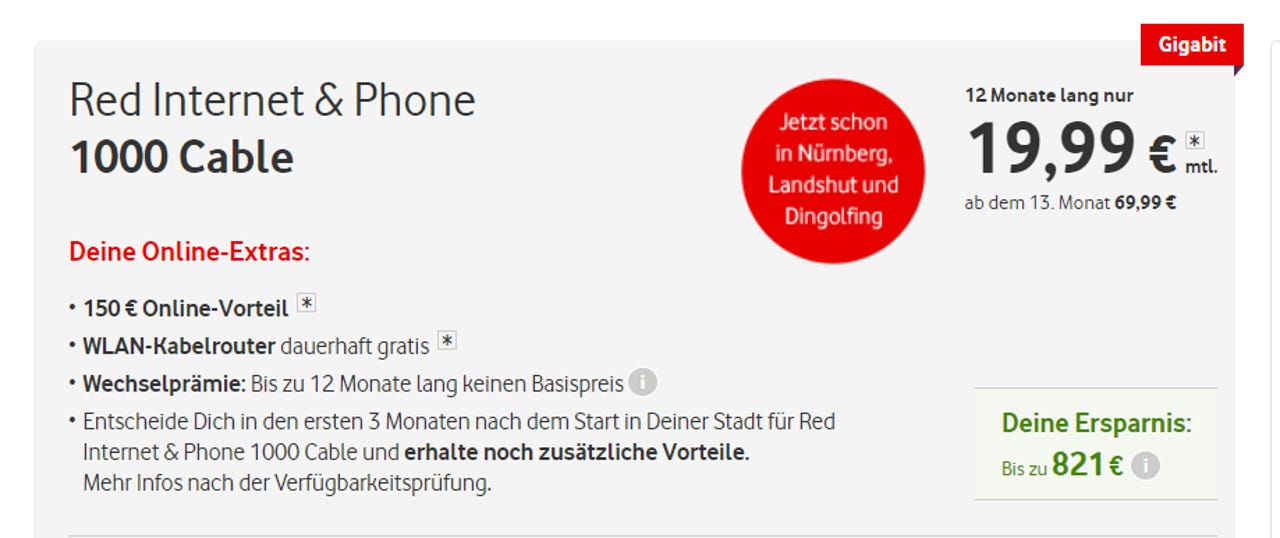Vodafone Deutschland launches gigabit cable broadband


Vodafone Deutschland has announced the launch of its gigabit-speed cable service in the areas of Nuremberg, Landshut, and Dingolfing in Germany's southern-most state of Bavaria.
Making good on the "Giga-Cable" prong of its Gigabit Investment Plan announced a year ago, Vodafone Deutschland's cable service provides download speeds of 1Gbps and upload speeds of 50Mbps, with the product available for €19.99 per month for the first 12 months.
After this, it will be charged at €69.99 per month.
The carrier had in September 2017 announced that it would be investing €2 billion in capital expenditure by the end of 2021 to deploy gigabit broadband to around 13.7 million premises in Germany, with the Giga-Cable effort aimed at delivering gigabit speeds to 12.6 million homes using €2 million in capex.
Under Giga-Business, Vodafone Deutschland is targeting 100,000 businesses in 2,000 areas under an investment of between €1.4 billion and €1.6 billion; while Giga-Municipality will involve investing between €2 million and €4 million to extend 1Gbps services to 1 million rural homes in partnership with local municipalities.
"I am excited to announce this transformational investment plan for Germany, which will bring gigabit broadband services to millions of consumers and businesses," Vodafone Germany CEO Hannes Ametsreiter said last year.
"The project is consistent with our strategic goal to become a leading converged communications operator in Germany, enabled by a best-in-class gigabit network infrastructure."
Vodafone Deutschland then announced in May this year that it will be acquiring Liberty Global's assets across Europe for €18.4 billion to expand its cable, broadband, and mobile networks across the continent.
The acquisition will allow it to reach 110 million premises with either cable or fibre broadband connections, which Vodafone at the time said would accelerate its "converged communications strategy through in-market consolidation in Vodafone's largest market, Germany" as well as in the Czech Republic, Hungary, and Romania.
According to Vodafone, it is aiming to bring gigabit-speed broadband to 25 million German premises by the end of 2022.
Across the Czech Republic, Hungary, and Romania, Vodafone said it would reach 1.8 million homes with broadband, 15.8 million with mobile, and 2.1 million with TV services.
"This transaction will create the first truly converged pan-European champion of competition. It represents a step change in Europe's transition to a Gigabit Society," Vodafone Group CEO Vittorio Colao said at the time.
"Vodafone will become Europe's leading next generation network owner, serving the largest number of mobile customers and households across the EU."
German Federal Minister Alexander Dobrindt had in March 2017 announced a €100 billion fund with the Netzallianz Digitales Germany to ensure gigabit-speed mobile and fixed-line broadband connectivity by 2025.
"We need more bandwidth, reliable real-time transmission, and intelligent networks that process, prioritise, and transport data as quickly as possible to the user," Dobrindt said last year.
"To this end, we are now building next-generation broadband networks, bringing together the most advanced technologies, such as fibre and the future 5G mobile communications standard."
Dobrindt's announcement came less than two years after the German government had said it would spend €2.7 billion to ensure that every citizen had minimum broadband speeds of 50Mbps by 2018, using funds raised through a spectrum auction.
While incumbent broadband provider Deutsche Telekom last year said it would be "impossible" to roll out fibre to all premises in Germany due to time, cost, and construction constraints, it last month announced that it will be providing gigabit-speed fibre broadband services to around 19,000 businesses in 103 business parks in 61 municipalities.
This is in addition to the 100 business parks it provided the service to during 2018.
"Our goal for 2022 is to connect 3,000 business parks across Germany to our fibre-optic network," Deutsche Telekom director for Business Customers Hagen Rickmann said.
Related Coverage
NBN finally launches DOCSIS 3.1 across HFC network
DOCSIS 3.1 technology will double the downstream capacity across the hybrid fibre-coaxial network, with NBN saying it is focused on improved experience rather than faster speeds.
CableLabs completes Full Duplex DOCSIS specs for 10/10Gbps cable broadband
CableLabs has announced completing the specs of its DOCSIS technology's next iteration, which could enable 10Gbps symmetrical speeds across hybrid fibre-coaxial broadband networks.
AT&T clocks gigabit 5G connections in first three cities
5G trials with residential and business customers in Texas, Michigan, and Indiana have provided AT&T with data on its mmWave deployments, with speeds consistently hitting 1Gbps.
How Vodafone plans to bring holographic conference calls to UK with 1,000 5G sites (TechRepublic)
The 5G sites will be up by 2020, bringing speeds that can power new business cases such as connected cars, factories, and cities.
How Vodafone hopes to spur IoT growth by expanding Narrowband-IoT network (TechRepublic)
At MWC Americas 2018, TechRepublic spoke with Ludo Fassati, Head of IoT in the Americas at Vodafone about the company's plans to expand it's LPWA Narrowband-IoT (NB-IoT) network.